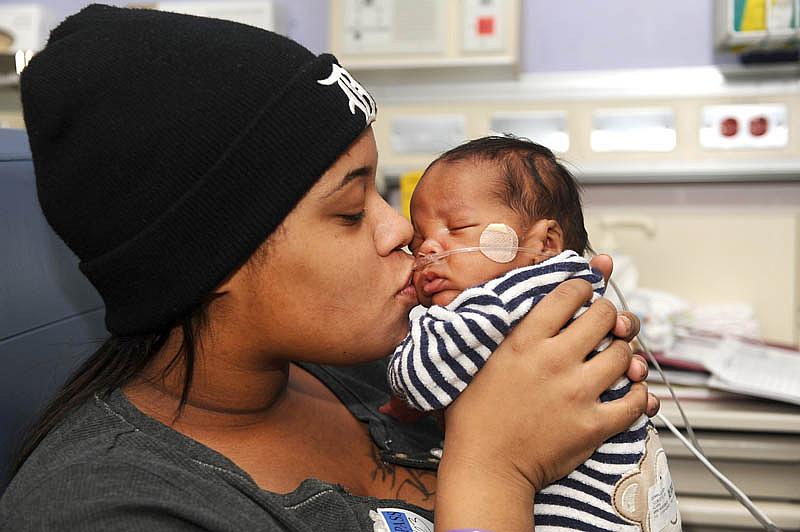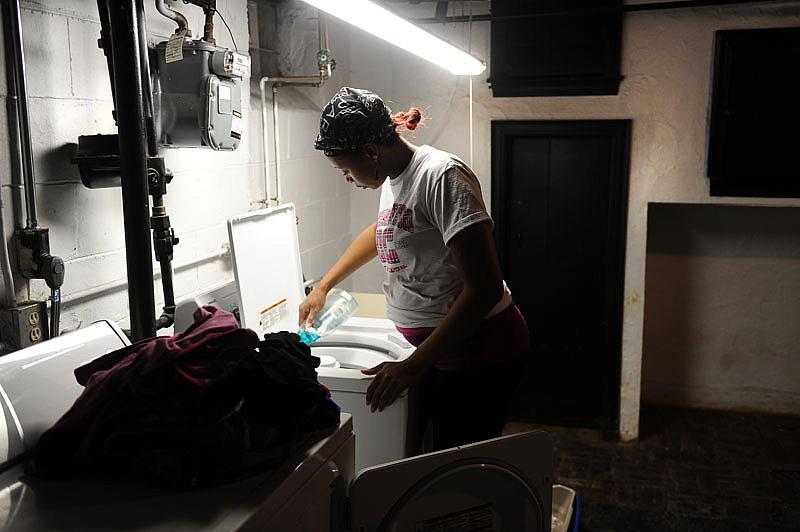Infant mortality rate in Detroit rivals areas of Third World
More babies are born prematurely in Detroit than in any major city in the United States, a Detroit News investigation found. Prematurity, whose deadly side effects include brain hemorrhages, collapsed lungs and failing organs, is the leading killer of Detroit’s babies.
Karen Bouffard wrote this report for the Detroit News a 2013 National Health Journalism Fellow. Other stories in the series include:
Detroit children dying in culture of violence
Mobile units take care right to kids
Duggan to tackle infant mortality in wake of News' study
Detroit researchers look at causes of premature births
Program helps kids by helping moms be better parents
Stressful childhood tied to future health risks
Detroit is deadliest city for children due to prematurity, violence

Alaina Gonville kisses her 3-month-old Brandon at the Neonatal Intensive Care Unit at Hutzel Women's Hospital in Detroit. Brandon was born premature through an emergency C-section. (Max Ortiz / The Detroit News)
Like most new moms, 19-year-old Alaina Gonville loves her newborn son, Brandon, with all her heart.
But like so many babies born in Detroit, little Brandon has faced more than his share of challenges from the minute he entered the world five weeks early, on Oct. 28, at Harper University Hospital.
More babies, like Brandon, are born prematurely in Detroit than in any major city in the United States, a Detroit News investigation found.
Prematurity, whose deadly side effects include brain hemorrhages, collapsed lungs and failing organs, is the leading killer of Detroit’s babies. It’s the major component of infant mortality — a catch-all term comprising all conditions that claim children before their first birthday.
Infant mortality is the No. 1 killer of Detroit children; violence is second. In 2011 alone, 130 of the 208 Detroit children who died that year had not yet marked their first birthday.
“It’s infuriating, because we know we can change the trajectory of these numbers,” said Kristen McDonald, vice president of program and policy for the Detroit-based Skillman Foundation.
The News found that Detroit has more babies born to moms who are under 20, like Gonville, and to single women, than in any other major American city. And often, those young women are not themselves in good health and otherwise ill-equipped to have babies.
Looking for answers
The challenges of caring for an infant are daunting in one of the nation’s poorest, most violent cities. Detroit’s infant mortality rate is the worst among big U.S. cities, and worse than some Third-World countries: 13.5 for every 1,000 live births in 2010, the most recent year for which comprehensive data are available.
Foundations, hospitals, social service and government agencies are attempting to tackle the problem through nurse visits, parenting programs and even special tests and treatment for physical conditions found more frequently among black Detroit women. The W.K. Kellogg Foundation alone invests $25 million annually in grants to projects that improve health and well-being in Detroit.
The cocktail of remedies can’t come fast enough: 2,300 Detroit babies died before their first birthday between 2000 and 2011, the most recent year data are available from the Michigan Department of Community Health.
Factors include pervasive poverty, young and uninformed mothers, poor prenatal care and even race.
Detroit’s infant mortality rate has changed little over more than a decade, despite efforts that have reduced infant deaths statewide.
“We know in Lansing and at the Department of Community Health that infant deaths and child deaths must remain the main focus of our programs,” said Dr. Matt Davis, chief medical executive for Michigan and professor of pediatrics and internal medicine at the University of Michigan. “Infants have the most fragile health of any age of child (and) the families that have children are for a variety of reasons under a lot of economic stress.
“The reason that making progress on infant deaths is so challenging is that it is a powerful combination of fragile health and vulnerable economic situations. And so a successful strategy in public health and health care, to reduce infant mortality, needs to have strong medical approaches and strong social approaches.”
Care, support key
Experts blame a confluence of health risks for Detroit’s high infant mortality rate, including inadequate health care, information, support and know-how by young mothers.
Eighty percent of new Detroit mothers are unmarried, compared with 42 percent of all Michigan moms, which may mean they have less support — financial as well as emotional — than women with husbands. Also, the city has more teen moms than any other in America: 18 percent.
Teens who become mothers before graduating from high school are less likely to complete high school or go on to college, dooming them to a future of low-wage jobs.
And since a mother’s education is proven to be one of the best indicators of how well a child will do in school, their children start out with the odds stacked against them.
Alaina’s son, Brandon, was delivered by Caesarian section after 35 weeks of gestation, weighing 5 pounds, 8 ounces.
Babies born four, five or six weeks early are called “late preterm” to distinguish them from the very tiny preemies that are born at 32 weeks gestation or even earlier.
According to Dr. Roberto Romero, director of the Perinatal Research Branch of the National Institutes of Health, housed at the Detroit Medical Center, about 70 percent of preterm babies are “late preterm,” and they face special health risks.
“There has been a perception that these babies generally do well because they are more mature,” Romero said. “But recently it has been recognized that babies who are born late preterm have a greater risk of dying before the age of one, or having other complications such as cerebral palsy, (or) having respiratory difficulties. So a baby that is late preterm, between 34 and 36 weeks of gestation, even though he looks very similar to a term baby, those are not the same.”
Brandon, suffering from a blood clot on his kidney, spent 67 days in the neonatal intensive care unit at Harper University Hospital. When Alaina took him home to her aunt’s house on Jan. 2, he was plump and sassy.
“He’s getting fat — he’s 8 pounds, 11 ounces,” Alaina said.
Her challenge will be to continue obtaining the social support and resources she needs to care for Brandon, and to maintain her own health.
“What we know in our neighborhoods is that we have a very high percentage of teenage moms,” said Kristen McDonald, vice president of policy and programs with the Detroit-based Skillman Foundation, which has multiple projects aimed at improving safety and strengthening families in six Detroit neighborhoods.
“Many of them have had very little if no prenatal care and tend to be very, very isolated.”
Doctor shortage
Darnella Miller hopes with the support of parenting class offered at St. John's Hospital in Detroit she can have the custody of three of her children returned to her. (Max Ortiz / The Detroit News)
Exacerbating the situation: The city has a shortage of primary care physicians, and not all accept Medicaid. Pregnant women are challenged to find safe housing, healthy food and transportation.
Detroit’s high concentration of African-Americans may also play a role in the city’s infant mortality rate, because preterm births are more common in African-Americans for reasons not fully understood.
African-American babies also face greater risks of death in their first days of life, according to Romero.
“There is an ethnic disparity,” Romero said. “If we look at the period from birth to 28 days, African-Americans have a mortality rate that’s approximately double of Caucasians.”
Resources available
Michigan is expanding by nearly 500,000 the number of state residents eligible for Medicaid. That expansion takes effect April 1 and could have significant impact on Detroit’s infant mortality problem, said U-M’s Dr. Davis. Gov. Rick Snyder also has made infant mortality a priority, and a state Infant Mortality Reduction Plan was developed in 2012.
According to Davis, women who are not pregnant or nursing are currently ineligible for Medicaid, and as a result, many low-income women enter pregnancy in poor health. Mothers are then kicked out of Medicaid coverage just weeks after delivering their babies, he said.
“They might not have had routine health care themselves, and may not be entering that pregnancy with optimal health or having appropriate care for health problems like high blood pressure or diabetes that place their babies at higher risk for health problems,” Davis said. “The Healthy Michigan plan will likely provide coverage to many women and allow them to identify and get treatment for health problems before they get pregnant so they can get treatment and have healthier babies."
Foundations, agencies and hospitals are providing support through programs like St. John Hospital and Medical Center’s Infant Mortality Program, which matches pregnant women and new mothers to mentors who provide them with emotional support and education, and connect them with community resources. The WIN program (Women-Inspired Neighborhood Network), funded by the WK Kellogg Foundation, has trained six health workers to provide similar support to 1,500 pregnant and new moms in Detroit’s Brightmoor, Osborn, and Chadsey-Condon neighborhoods.
Meanwhile, researchers at the Detroit Medical Center have made groundbreaking discoveries into the causes of premature delivery and are providing some Detroit moms with treatments that are prolonging their pregnancies.
“We know that if we concentrate medical care on mothers and young babies (this) can have very dramatic impact on infant mortality rates, and so there are some really important pieces of work that are happening but they are not done at a big enough scale,” said McDonald, of the Skillman Foundation.
“We truly need to be very intentional about ... making sure that there is outreach to mothers so that they are not isolated, that there are services wrapped about them and their new babies to make sure that we’re very intentionally going after them. It’s infuriating, because we know we can change the trajectory of these numbers.”
This story was originally published in The Detroit News and includes videos, more photos, and an interactive graphic.
Photo Credit: Max Ortiz / The Detroit News

